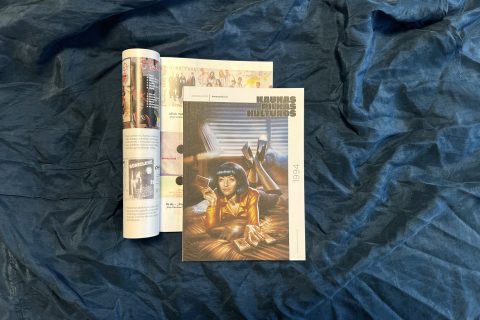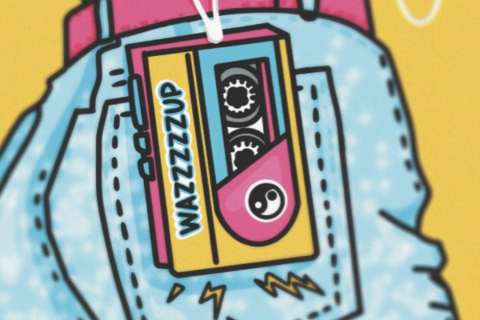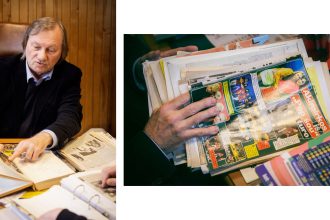You turn the radio on and there he is! Ramūnas Zilnys is interviewing an interesting, new band yet again. On television, his voice and face are also inseparable from various music events. The native of Kaunas has been talking about music, interviewing artists, hosting concerts, and sharing musical discoveries for thirty years.
I don’t know another journalist who hasn’t changed their specialty over such a long time and who hasn’t switched to the field of communication or somehow betrayed his first love. Professional success here is determined not only by the talent to write, ask the right questions, and appear at the right place at the right time but also by a great love for the content. I think you would agree that business journalists are not that crazy about euros. And yet, to say that nothing has changed in the life of Lithuania’s most important music journalist in 30 years would be a big lie. We will discuss these changes, but first: a short biography.
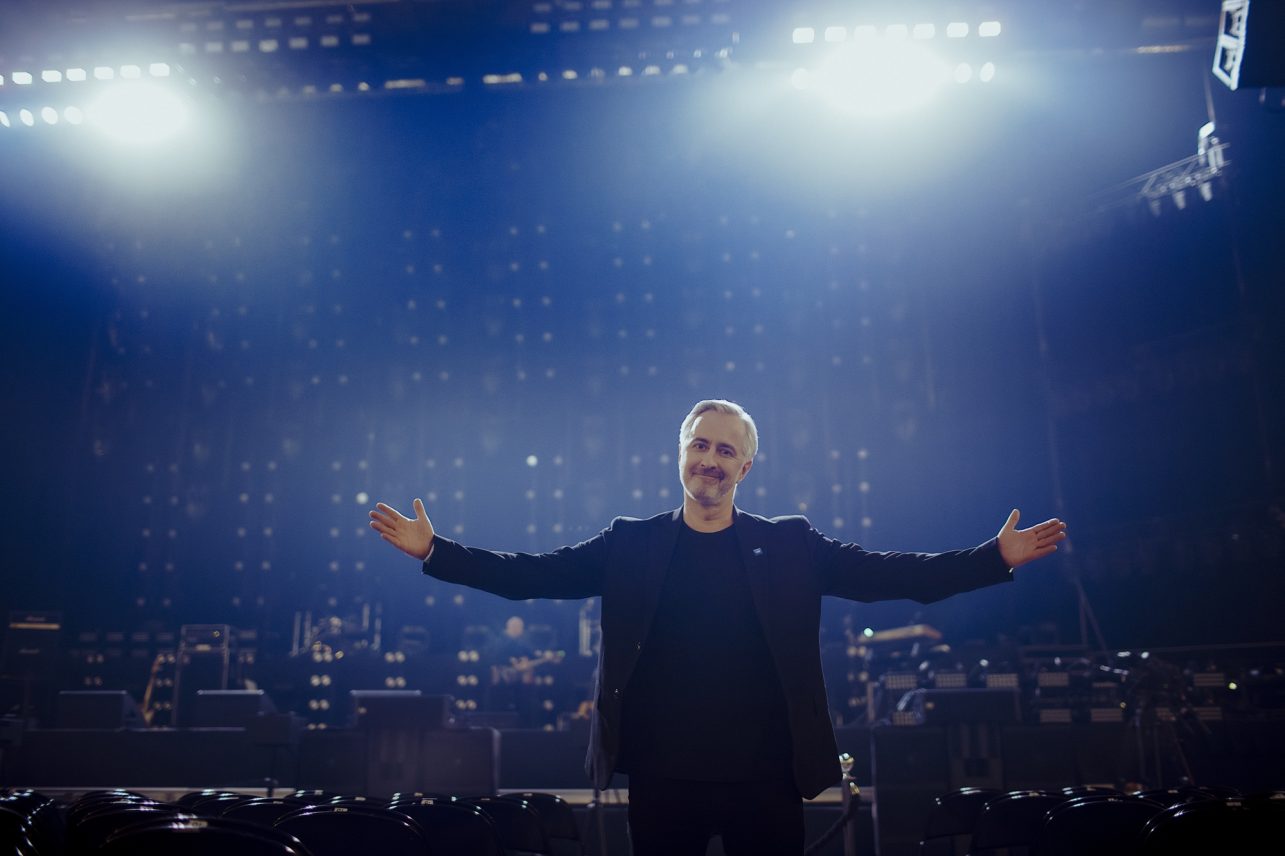
In 1993, at the age of 14, Ramūnas got a job at the Titanika radio station, which was operating in the Kaunas County Public Library. The teenager was offered the job because he often called the radio. Ramūnas worked there for two years, until the radio station broke into two. Part of the team became Kauno fonas, while the other part, together with Ramūnas, was reborn as a sports radio station which operated in the premises of the current Lithuanian Sports University. “It wasn’t a very successful project,” the music journalist answered smiling. When he was still working at Titanika, he received suggestions to write something. Several of his texts were published in Nemunas; the teen was even awarded the Young Writer’s Prize worth of 800 litas. For half a year, he hosted nightly shows on the legendary station Ultra Vires. At the age of 16, he also became one of the hosts of the Kaunas Plus TV show Muzikos pasaulyje (In the Music World). He remembers that in those days you could do anything on TV. When asked where he used to get his information in the absence of Wiki and social networks, he recalls such inventions like teletext. MTV, the global music giant, used to publish various news via it, and everyone else would write it all down. Ramūnas and I laughed after remembering the Polish magazine Bravo. I only flipped through it, but Ramūnas often used it for work.
“And when these jobs were over, I met Indrė, the daughter of Alvidas Tautkus, at a party and I asked her if the show they were working on, Pop TV, needed any people.” Ramūnas spent two years on that show and after that the Laikinoji sostinė, Kaunas branch of the daily newspaper Lietuvos rytas, followed. Soon after, the talented young man received an invitation to move to Vilnius and continue his career in the main editorial office. After spending many years there, he is now part of the LRT family.
Ramūnas, where and how did you grow up? What was the city like at that time?
I didn’t have a carefree adolescence, because I started working early. I started working at a radio station at the age of fourteen. I grew up in Partizanų Street. The end of Savanorių Avenue was not the best part of the city then, and maybe even today. My mother was rather strict. She did not tolerate aimless wandering in the city center, protected me from things that were happening in the neighborhood, and also told me to be careful. I think that was standard parenting back in the day. Let’s not forget that times were tough back then, the system of values in shambles. It was not clear what was worth pursuing in life. Parents encouraged learning and education, but there were also street smarts – the theory that after the ninth grade, you should go and sell stuff in a marketplace. You could even find a teacher selling bleached jeans at the so-called 25-mečio market because it was the only way to survive. There was a lot of chaos; in people’s heads as well.
I have encountered aggression, which is inevitably mentioned when talking about Kaunas of that time, but only on the surface level. It was not unusual, if you had a piercing in your ear – and I had one – to receive insults from strangers even in the city center. Or the fact that several hooligans were trying to rob me of my leather jacket – which I bought with my prize money – in broad daylight just outside the stairwell. The intolerance of those who look different was not a myth. But nothing particularly bad has ever happened to me, and besides, I wouldn’t single out Kaunas: that’s how things were in most parts of Lithuania. The capital seemed a bit more liberal to us. We read about the subcultures in the press, we heard that people there were more daring, more interesting… So it was natural that I, as a teenager, wanted to move to Vilnius.
Were you already a music lover and music collector as a teenager? Where are those records now?
I grew up in a poor family and didn’t even have a cassette player. We had an old turntable and some of my dad’s records. Maybe that’s why radio took such an important place in my life. New independent stations became a gateway to the music world, and I listened to them religiously. It is interesting to meet people who used to do the same thing, for example, write down M-1 TOP 40 in a notebook and then mark the changes. My uncle brought a hi-fi system as a gift from Germany. There were a lot of music records in Titanika and I was able to copy them. Now we call it piracy, and in those days it was the most natural thing in the world. Buying CDs was difficult. One would cost about 65 euros, which was a fifth of a decent monthly salary. I had fifteen original CDs that I treasured like crazy, and they were all gifts. I still have them somewhere, although I haven’t taken my old collection of several thousand CDs out of the boxes for about eight years. I plan to reselect, and keep those albums that have sentimental value. I don’t even have a CD player now. I have a turntable and vinyl records but I don’t know how many anymore. There will definitely be a thousand, maybe more.
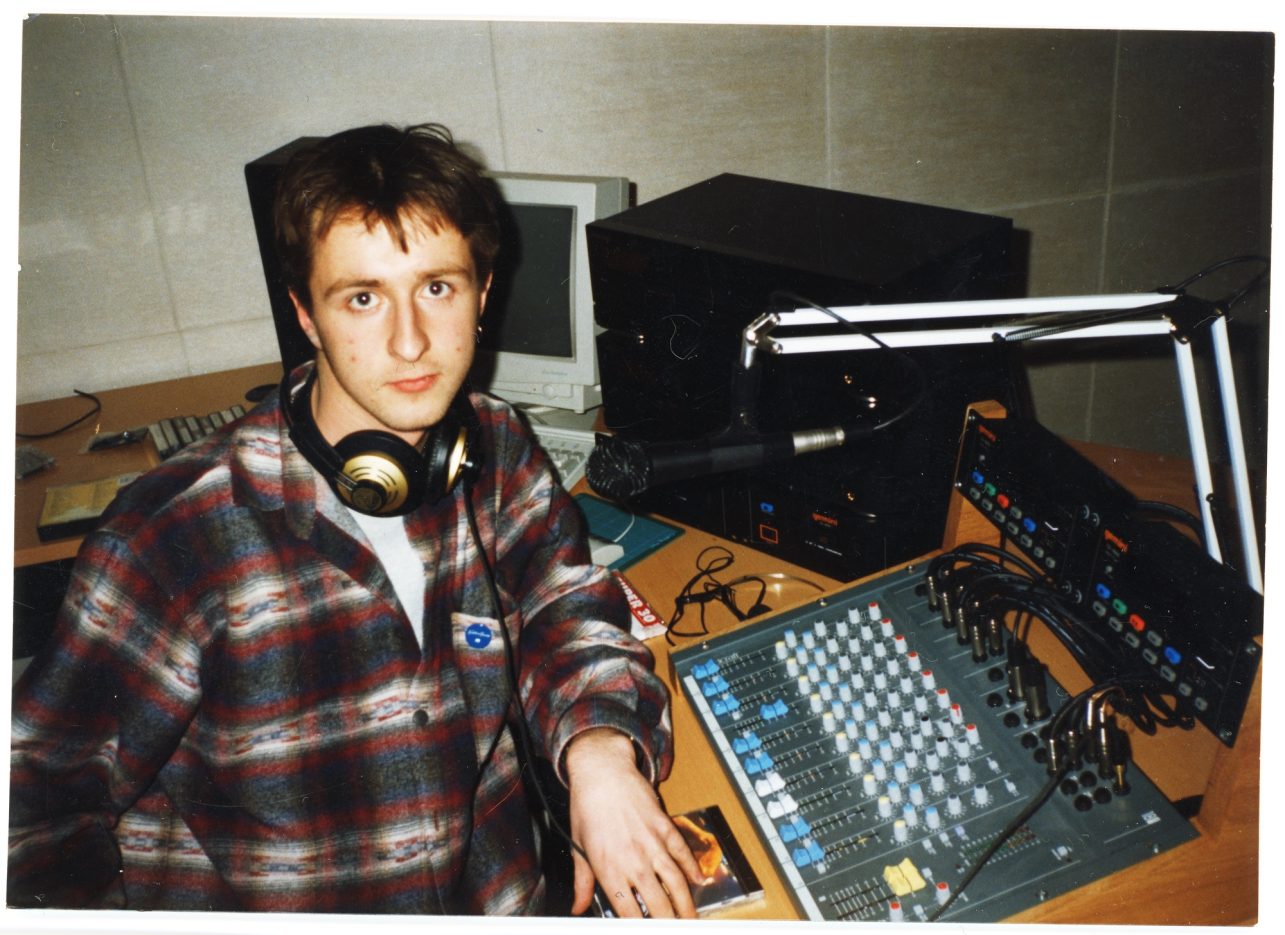
I will admit that at that time my biggest dream was to get a job in a record store. When I was 16-18 years old, I used to hang out in Bomba store near Kaunas municipality, where I bought original cassette tapes (they were also not cheap, about 18-22 litas). Bomba was a sacred place, it had everything you could dream of. The legendary bard Alfredas Kukaitis, whom I met in Titanika, later Šarūnas Karalius, who became a famous DJ and now a whiskey producer, worked there, as well as indie legend Vaidas Jasinskas (you can find an interview with Vaidas in the April 2019 issue, ed.). Surprisingly, they let me hang there, even though I must have been quite annoying.
Ramūnas, you seem very busy. You can be found in all the important concerts where you interview Lithuanians and foreign guests. Is there space for anything else next to music journalism?
After switching to LRT five years ago, my life changed dramatically. I used to have to write the appropriate amount of lines per day. Now I have radio, TV shows, podcasts, concerts, and choosing what documentaries to show the viewers. There is plenty of work and I am happy about it. Is there room for other things? Always! And they exist. After all, the question is more about the meaning and profitability of this activity. I am not sure if what I do is necessary for anyone, and this is how the majority of people who engage in similar activities feel. Music journalism is going through a major crisis. The reason is simple: in the past, you needed someone with knowledge and authority to tell you about something valuable and interesting and help you decide which album to buy when you went to the store. You don’t need it anymore. It is enough to listen to Spotify for three days and it will become your advisor. The specifics of music criticism differ from those of theatre or literature – a song only takes a few minutes, which anyone can spare. Reading a book takes much more time and going to a theatre requires physical effort.
Have you already had the interview of your life?
Sometimes when you get stuck in a routine, what you do doesn’t seem very impressive, you’re driven by your own momentum. But, for example, Yann Tiersen will perform in Vilnius tonight. More than once, I have had to find a text about a certain person or their music written when they had previously visited Lithuania, and the same happened now as well. I was surprised at the amount of genuine enthusiasm and passion in my text. Although it didn’t seem like that at the time… So, it’s hard to assess which works are the best. For example, I interviewed the great American artist Jose Luis Vasquez aka The Soft Moon on a radio show last year. He passed away under very sad circumstances this January. I remember that interview as quite difficult, the interviewee turned out to be an introvert. The person who then escorted him to the studio reminded me after the artist died that I asked “How would you like to be remembered when you die?” There are things you don’t capture at the time, but they become memorable. Well, then there are people like Martin Gore from Depeche Mode. I interviewed him three times and my hands were shaking during every single interview. But is it the interview of a lifetime? I hope the best is yet to come.
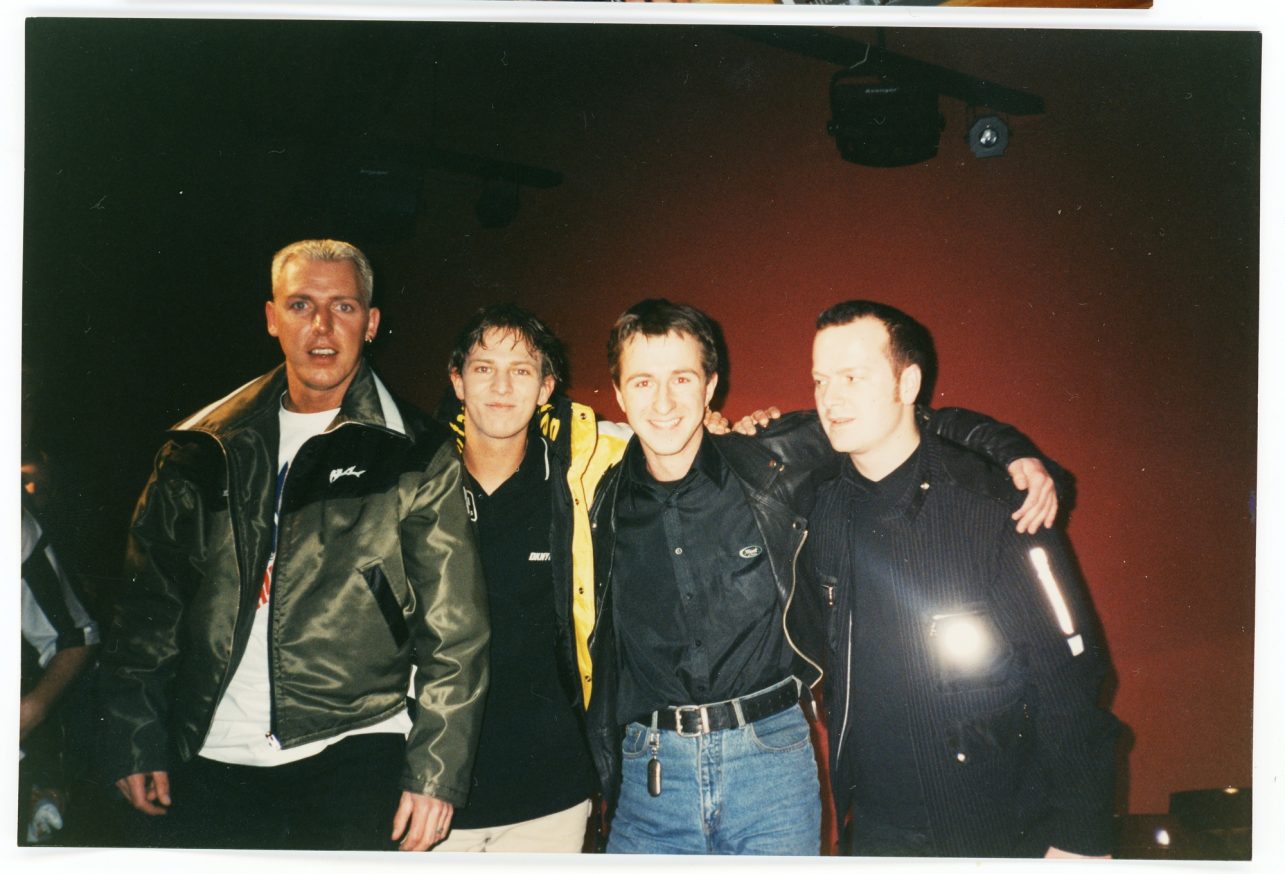
Was it easier for young musicians to start their careers in the 90s or now?
We recently talked about it with Dr. Green vocalist Dominykas Kunčinas (the band has recently returned to the stage) and our thoughts are identical on this matter. In the past, to record an album, you needed more people who believed in you, more investment, and more time. It acted as a filter and some people did not pass it. But the competition in the market was not as big. If you released a cassette, Ausis magazine would have probably written about you, and people would have come to the concert. Now it’s easier to record and release your music. There are more venues to play at, more listeners and events, as well as more expensive tickets; we’re experiencing an upswing. But artists have some rather unrealistic expectations as if the world owes them just for having an idea. I constantly receive press releases about promising musicians and their music videos. Then, after a second or a third song they disappear because nobody listens to them. And why should they? So my answer would be that it is easier to start now but much harder to make your way and survive.
I recently saw ba. in Žalgiris Arena and remembered what fan culture was like in the past. The bands had fan clubs! You could tell by the T-shirt who you were dealing with. Now I don’t know of any, do you?
Now a fan club is no longer a physical place with an address and a manager who organizes meetings with the band, but, for example, Saulės kliošas organizes an album pre-release parties. And speaking of ba. While in Druskininkai once, I went to a Senfortis bar and 27 people out of 40 had ba. jumpers and T-shirts on. Benas might not have an official fan club, but he has such strongly visually identifiable fans that others could envy. And I would say that Solo ansamblis has also gathered a kind of a tribe.
Which musicians were the friendliest to you when you started working as a journalist?
I would say all of them! The attitude of musicians towards journalists fluctuates. There was a time when a journalist was a musician’s best friend, always allowed backstage.
I remember how everyone was surprised when Andrius Mamontovas released Šiaurės naktis. Pusė penkių and declared that he would not give an interview to anyone for a year! The first signs of the yellow press appeared. Along with jokes, various leaks of musicians’ adventures began, and the artists started to wonder if journalists were really their friends. All the admissions backstage ended. I remember how SKAMP said at some award ceremony that they would like to spend some time without journalists. I was a little offended, it was just unusual. Then the Internet spread, phones that could film… First of all, foreign musicians started to be very careful. A chasm appeared. Then the musicians wanted to control the narrative: what and how is said, what photographs are used. And now we find ourselves in a rather paradoxical situation. Internet media realized that few people read articles about music… Many musicians would be happy to give a longer interview, but few devote time, and attention to it or even publish it. Press release culture is related to this. Therefore, almost no one refuses interviews anymore.

Could you have imagined in the 90s that we would continue attending Dinamika, Mamontovas, or Karališka erdvė gigs in 2024? Did you have an idea back then, who will be famous many years after?
I would not have believed then that at 45 I would be doing almost the same things. At 22, I was in a meeting with young people looking for their own career path, my workplace sent me. Back then, I gave myself another five years. Well, I was wrong.
And I would not have been surprised about Mamontovas remaining on the stage for many years. However, people don’t just love him because of the past. He continues to write new songs and he experiments. Now some artists ride on the wave of nostalgia, which would have seemed strange back then, but it is not at all peculiar today. This wave is global. People who attend the concerts of bands that got reunited, want to be young again.
Which concerts do you remember with nostalgia?
The visits of foreign artists were impressive. I remember how the singer Plavka, who was on the MTV charts with the duet Jam & Spoon performed in the Kaunas Sports Hall. Today that concert would seem shabby and ridiculous, but it was a big deal back then.
Of course, I am very nostalgic for the Kaunas Jazz Festival. I went there for the first time 25 years ago and since then I haven’t missed a single moment, I met my future wife there, and I hosted some concerts.
Now I even envy myself that feeling of witnessing someone coming to perform from abroad. It was as if they had descended from Mars. Press conferences were held, and all the media gathered. There was great excitement. I think it will never happen again. We are your usual Westerners now, and nothing surprises us anymore. Ed Sheeran is coming to Kaunas, and it is totally normal.

